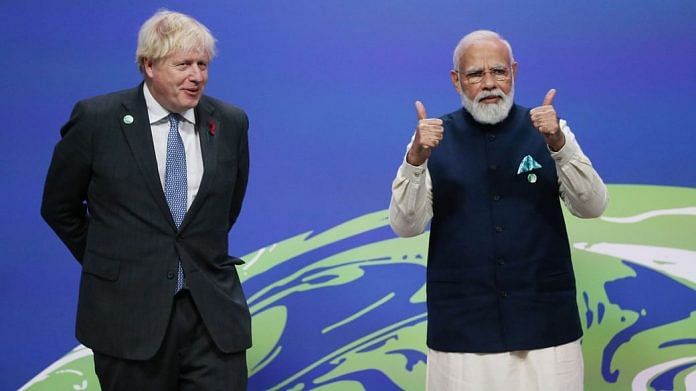British Prime Minister Boris Johnson visits India this week. He is scheduled to travel to Gujarat and New Delhi. On the face of it, the primary objective of the visit is to take stock of and further cement a long list of ‘to do’s inked in a “2030 roadmap.” A Free Trade Agreement is in the works, and might well be signed in 2022. The roadmap was launched during a virtual summit between Prime Ministers Johnson and Narendra Modi in May 2021. Terms such as “revitalise” and “re-energise” are dotted across the document. The road map is supposed to be the main vehicle through which the unique relationship between India and the UK is elevated to a “Comprehensive Strategic Partnership.”
Yet, Johnson’s visit is critical for many other reasons.
Partnership in transition
The road map articulates policy precision on a range of issues, from strengthening coordination in multilateral forums to greater cooperation in education, science, technology, trade and cultural relationships. It is the administrative and verbal bedrock of a partnership in the process of transition. From moving past the hesitancies of the old to discovering and re-discovering opportunities for the future. In the case of the former, issues around the UK’s somewhat cavalier attitudes – according to those in India – towards anti-Indian groups and absconders housed in the island-nation, vocal support by a smaller group of MPs in the House of Commons encouraging dialogue with Pakistan on Kashmir, or disappointment in India’s economic promise masked the potential of a relationship desperately in need of transformation.
Both Johnson and Modi have electrified the changing verve in the UK-India relationship. Whilst so-called legacy issues may still exasperate civil servants in both Whitehall and on Raisina Hill, they no longer serve as the principal arc of this changing bond. To be sure, “strategic” is the word that best defines the way in which policy mandarins approach this critical relationship.
Post-Brexit Britain needs India more than it did in the past. Britain’s “tilt to the Indo-Pacific” etched in its forward leaning policy architecture – the Integrated Review, makes it clear that by 2030, Britain’s objective is to be “deeply engaged in the Indo-Pacific as the European partner with the broadest, most integrated presence.” Equally, as a part of this advance, Johnson and his coterie of advisors are determined to “transform” its relationship with India.
Yet, to do so, both Britain and India will need to invest in more than roadmaps and deal announcements. The two countries will need a cottage industry of experts, supporters, and various networks – from dancers and singers to innovators, industrialists and teachers – to seize this moment of change.
The glaring irony of this relationship is that despite an Indian diaspora population of more than 1.6 million people living in the UK and the existence of a so-called “living bridge,” there is still, relatively limited understanding of each other’s realities. Indeed, diasporas can work both ways. British-Indian leaders can hamper the creative bounds of a relationship as much as they can expand them. The point is, there is nothing inherently beneficial about their existence and living history.
Also read Akshata Murty’s ‘financial impropriety’ case is a ‘white tax’ on brown, successful Rishi Sunak
A new bridge
Keeping this lacuna in mind, think tanks in India and the United Kingdom, supported by the two foreign ministries gave birth to the India-UK-Strategic Futures Forum (IUSFF). The IUSFF is designed as a less-formal forum that meets every year, trouble shoots, and serves as a link between experts and well-wishers on the one side and officials on the other. At the end of March 2022, coinciding with Liz Truss’ – the UK Foreign Secretary – visit to India, fifty to sixty technologists, security experts, parliamentarians, trade gurus and industry leaders spoke to each other behind closed virtual doors. The act of non-officials just talking, expressing scepticism, architecting progress, and debating transformative ideas is as unique as it is ironic – for a relationship as historically determined as that between India and Britain.
If implemented with zeal, the IUSFF could well become the most formative example of a bridge that works and where the weight of traffic can be measured across collaborations in space and fintech to the exchange of humour and instinct in a still guarded association. Yet, India and Britain need many more such forums and networks. As much as Johnson’s visit to India is about inaugurating manufacturing plants, assessing the future of defence ties, and reviewing progress on a roadmap of official fortitude, it ought to be an opportunity to fuse ties and ideas outside of the purview of officials and diplomats alike.
I remember well when Foreign Secretary Boris Johnson visited India in January 2017. He walked down the lanes of New Delhi’s Khan market, popped into a Royal Enfield store, and spent a couple of hours with a group of youngish innovators, writers, think tankers, teachers, and actors. He connected with a room and left a lasting impression. What officials, then, failed to do was to soak-up that energy and channelise it for the future. Johnson’s visit this week presents yet another set of opportunities, official and otherwise. Yet, this time, his advisors, their counterparts in India, and forward-minded diplomats in both the MEA and the FCDO have already done the spade-work. They have spent the past couple of months and years re-imagining this relationship. They now need to focus on implementation.
As Prime Minister, Johnson may well not have the time or luxury for off-the-mark conversations and walks down middle lanes, but his visit could and should serve to further electrify a cottage industry built by a completely new generation of Indian thinkers and doers. For it is these groups that can play a role in sustaining a relationship well beyond a defined roadmap or political timelines.
The author is the director of Carnegie India. He tweets @Rudra_81. Views are personal.
(Edited by Anurag Chaubey)



